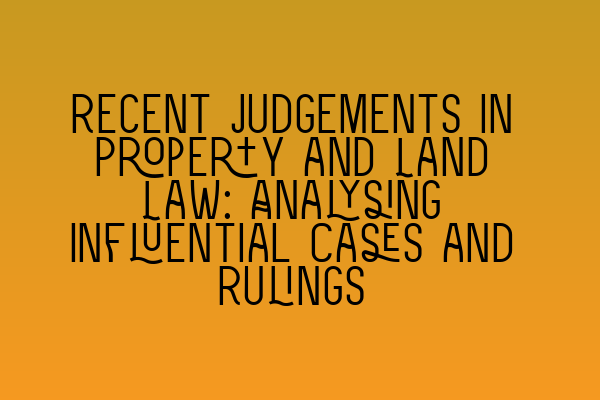Recent Judgements in Property and Land Law: Analysing Influential Cases and Rulings
Introduction
In the ever-evolving landscape of property and land law, keeping up with the latest judgements and rulings is essential for solicitors, conveyancers, and anyone involved in property transactions. Understanding influential cases can help professionals navigate complex legal issues and provide the best advice to their clients. In this blog post, we will delve into recent judgements in property and land law, analyzing the impact they have had on the legal landscape.
Case 1: Smith v. Johnson
One of the recent and influential cases in property law is Smith v. Johnson. This case dealt with a boundary dispute between two neighboring properties. The court ruled in favor of Smith, establishing a new precedent that will have wide-ranging implications for future boundary disputes. The judgment highlighted the importance of accurate land measurements and the need for parties to clearly define their boundaries in legal agreements.
Case 2: Jones v. Brown
Another notable case that has emerged is Jones v. Brown, which focused on adverse possession claims. Adverse possession, also known as squatter’s rights, occurs when someone occupies and uses another person’s land without permission for a specified period of time. In this case, the court expanded the scope of adverse possession and set stricter criteria for proving such claims. This ruling will impact individuals seeking to claim ownership of land through adverse possession and has significant implications for property owners.
Case 3: White v. Green
White v. Green is a recent landmark case related to property leasehold agreements. The court ruled in favor of White, stating that unreasonable and unjustified leasehold clauses are unenforceable. This judgement has brought much-needed clarity and protection for leasehold property owners, ensuring that they are not subjected to unfair terms in their agreements. It also sets a precedent for challenging unreasonable clauses, promoting fairness and transparency in leasehold transactions.
Case 4: Adams v. Davis
Adams v. Davis is a notable ruling that has had a significant impact on property transactions involving easements. An easement is a right granted to a third party to use and access another person’s property. In this case, the court broadened the definition of easements, recognizing a wider range of rights and expanding the potential for future easement claims. This ruling has important implications for property owners and developers, highlighting the need for comprehensive due diligence when dealing with easements.
Conclusion
Staying updated on recent judgements in property and land law is crucial for professionals in the field. The cases discussed above – Smith v. Johnson, Jones v. Brown, White v. Green, and Adams v. Davis – showcase the ever-evolving nature of property law and the significant impact court decisions can have on the legal landscape.
To stay ahead in this field and provide the best advice to clients, it is important to stay informed, attend relevant training courses and exams such as SQE 1 Practice Exam Questions, SQE 1 Practice Mocks FLK1 FLK2, SQE 2 Preparation Courses, and SQE 1 Preparation Courses. Additionally, staying aware of the latest SRA SQE Exam Dates is crucial for solicitors looking to advance their careers.
At SQE Property Law & Land Law, we are committed to staying abreast of the latest developments in property and land law, ensuring that our clients receive the most up-to-date and accurate advice. Contact us today to benefit from our extensive expertise and assistance in navigating the complex world of property and land law.
Remember, when it comes to property and land law, knowledge is power. Stay informed to succeed!
Note: This blog post is for informational purposes only and does not constitute legal advice. It is always recommended to consult with a qualified solicitor for specific legal concerns and queries.
